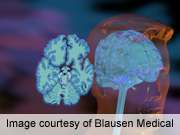Depression linked to reduced temporofrontolimbic coupling

(HealthDay) -- Patients with remitted major depressive disorder (MDD) have reduced guilt-selective temporofrontolimbic coupling between the right superior anterior temporal lobe (ATL) and subgenual cingulate cortex and adjacent septal region (SCSR), a region of interest for biases toward guilt versus indignation, according to a study published online June 4 in the Archives of General Psychiatry.
Sophie Green, Ph.D., from the University of Manchester in the United Kingdom, and colleagues used functional magnetic resonance imaging to investigate whether individuals with MDD exhibit guilt-selective SCSR-ATL decoupling. Participants included 25 patients with remitted MDD and 22 controls with no personal or family history of MDD.
The researchers identified a guilt-selective decrease in ATL-SCSR coupling in patients with MDD, compared with controls. In addition, while controlling for medication status and intensity of negative emotions, there was decoupling seen with medial frontopolar, right hippocampal, and lateral hypothalamic areas. Lower levels of ATL-SCSR coupling correlated with elevated scores on the 67-item Interpersonal Guilt Questionnaire, a validated measure of overgeneralized self-blame.
"We demonstrated a guilt-selective decrease in ATL coupling in remitted MDD across a frontolimbic network of the SCSR, medial frontopolar cortex, lateral hypothalamus, and hippocampus," the authors write. "These results shed new light on the pathophysiology of vulnerability to MDD by providing a specific neural mechanism that can account for self-blaming biases long known to be a core and distinctive feature of MDD."
More information:
Abstract
Full Text
Copyright © 2012 HealthDay. All rights reserved.















